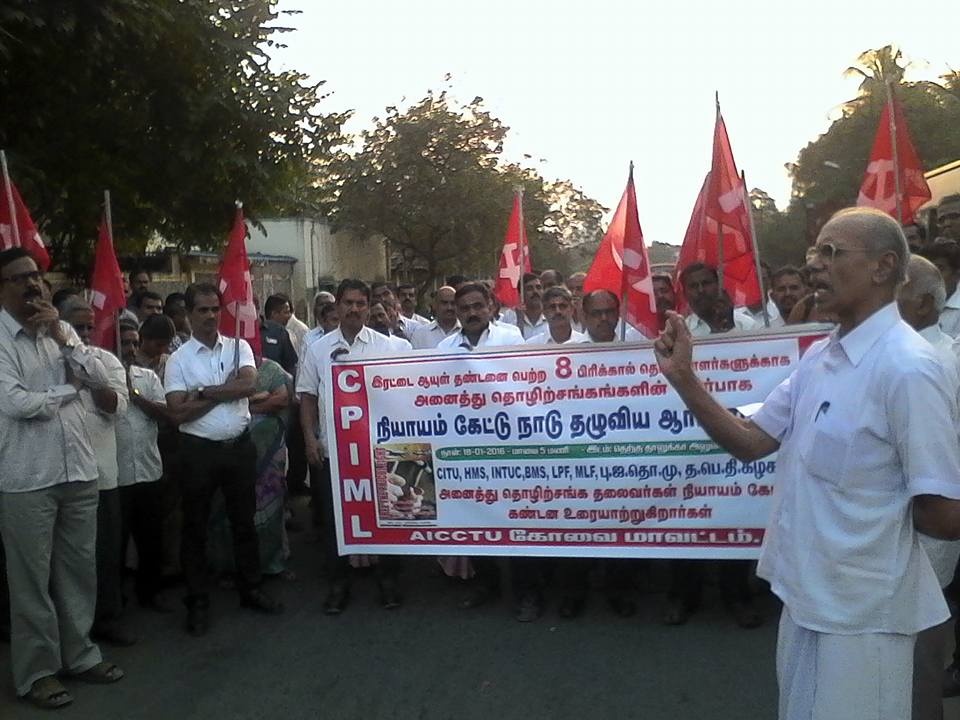Read this article in:
English
12 February, 2016An appeal has been launched on behalf eight former Pricol workers in India sentenced to double life imprisonment in a trial riddled with irregularities and contradictions.
The severity of the court verdict has been condemned by trade unions in India, and is regarded as an attack on workers and unions in the country.
The eight men, who are active members of the All India Central Council of Trade Unions (AICCTU), were workers at the Coimbatore plant of auto part manufacturer, Pricol Limited.
Last December, a Coimbatore court found the men guilty of the tragic death of Roy J George, Pricol’s human resources vice-president, who was killed on 21 September 2009 when negotiations over the dismissal of 41 employees turned violent.
While the AICCTU deplores the killing of Mr George, the union says there is no evidence to implicate the eight trade unionists in his murder and that the prosecution failed to prove their guilt during the trial.
The union filed an appeal on behalf of workers Gunabalan, Manivannan, Rajendran, Ramamurthy, Sampath, Saravanakumar, Sivakumar and Velmuruganin at the Chennai high court on 1 February 2016.
AICCTU and other central trade unions in Tamil Nadu including HMS, LPF, AITUC, CITU, AIUTUC, INTUC, WPTUC and BMS say the unfair sentence reflects the establishment’s antipathy towards workers. In Delhi on 27 January this year, central trade unions adopted a resolution expressing shock and concern over the extremely harsh punishment and appealed to all progressive and democratic forces to extend help in all possible forms in their efforts for bail and appeal.
A total of 27 workers and trade union activists, including four women, were initially charged with conspiracy and murder. According to Pricol union leader, M. Guruswamy, he and many of the workers were not even present inside the factory when the incident occurred.
The case also led A. Manikantan, one of the 27 workers accused of George’s murder, to commit suicide in October 2009, while another worker’s wife committed suicide in June 2015 apprehending conviction.
In total 19 workers and trade union leaders including Guruswamy and National President of AICCTU, S Kumarasamy, who were accused of having hatched the conspiracy and instigated the workers, were acquitted. The acquittal confirmed workers’ views that they were wrongly implicated in the case because of their participation in union activities.
The severity of the verdict needs to be understood against the backdrop of workers’ struggles at Pricol which began in 2007. In the face of poor working conditions and low wages, workers tried to win better rights both for regular and precarious by forming the Pricol Employees Trade Union in plant 1 and Coimbatore District Pricol Workers Trade Union at plant 3, which are both affiliated to AICCTU.
The Pricol management refused to recognize the union and engage in collective bargaining. Subsequently, union members had to go through interminable legal battles and face severe anti-union actions of the management including transfers of union office bearers, denial of wage increase, stoppage of increments and incentive, demotion, partial lock out, break in service and dismissals.
In May 2007, the Tamil Nadu government passed an order to restrain the management. Subsequently, workers had to face series of victimization measures in 2007 and 2008 including denial of allowances, terminations and demotions. However, workers continued their demand recognition of the union. At the same time, workers were also fighting illegal dismissals in the high court and Supreme Court. In May 2008 the Supreme Court passed an interim order allowing 62 partially locked out workers to return to work. However, anti-union actions continued all along with illegal wage deductions and dismissals.
Workers also objected to the deployment of contract workers in the factory’s main production work in violation of labour laws and launched a series of protests. In April 2009, the government issued detailed advice not to engage contract workers. In May 2009, a spot inspection report clearly stated that contract workers were engaged in direct production. Subsequently, in June 2009 a 15-day hunger strike by workers forced the government of Tamil Nadu to acknowledge the unfair labour practices in Pricol. The government issued orders (393 and 394) imposing conditions to regulate the recruitment of contract workers and apprentices in regular production.
Despite murder charges against the union members, the AICCTU remained focused in its work and the management finally recognized the union in 2011 and entered into collective bargaining agreement in 2012 and in 2015. These agreements resulted in significant benefits for workers in terms of wages, regularization of work for more than 230 workers, terminal benefits and working conditions. About 500 dismissed contract workers were provided compensation.
Read a detailed account of Pricol workers’ struggle since 2007 here and here. More information about the struggle and ambiguities in the trial process can be accessed from this Free the Pricol 8 publication.
AICCTU, along with other unions, have launched a nationwide campaign to secure the release of the eight men. They are holding protests across the country and have appealed for the solidarity from the national and international trade union movement in their struggle for justice. Solidarity messages can be sent through email at [email protected]. They also issued a call for solidarity funds to sustain the struggle.
